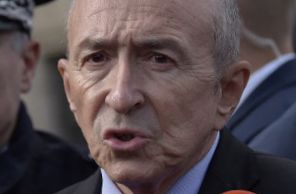France spells out four ways to step up fight against terrorism
Frances new government is setting a less-regimented course to regulate terrorism ahead of replacing the countrys two-year state of emergency later in 2017.
Frances new government is setting a less-regimented course to regulate terrorism ahead of replacing the countrys two-year state of emergency later in 2017. Interior Minister Gerard Collomb, the man tasked with the crucial job of creating new measures to combat acts of extremism in France, has presented his four-way plan to Parliament. The unveiling of the proposals comes just days after an attempted terror attack on the Champs-Elysees in Paris by an armed man who crashed his car into a police van. President Emmanuel Macron wants to once again extend the state of emergency that has been in place since the Paris attacks of November 2015. It is due to end on July 15 but Mr Macron is seeking a one-off five-month extension this year before introducing a raft of measures aimed at striking a true balance between necessary security for our citizens and the protection of individual liberties. Mr Collombs plans will include: new powers to close places of worship; surveillance of individuals to replace house arrest; ordering police raids to be the subject of authorisation by a judicial judge; and establishing cordons around protected areas at music concerts, sporting and national events. Several mosques in France have been found to be spreading radical ideology and jihadism and many have been closed since the state of emergency was first introduced, including the Rahma mosque in the greater Paris region of the Ile-de-France. If the new measures go ahead as planned, local authorities rather than the Interior Ministry will be able to take the decision to shut mosques where followers are being encouraged to commit acts of terrorism. “Authorities will be able to decide whether to close places of worship from the moment that they are found to inciting terrorism,” Mr Collomb said. The Interior Minister is keen for “house arrest to be replaced, notably by an obligation not to move beyond a set geographical area, allowing the person to maintain their professional and family life,” he said. “The area cannot be smaller than the town. Equally, there exists the possibility, for these people, with their agreement, to wear electronic tags,” he added. Mr Collomb also addressed the the role of police raids in the country`s fight against terrorism. “The measures foresee the possibility of authorities ordering visits that will be systematically subject to the authorisation of a judicial judge the Paris judge of liberties and detention who will alone be in charge of these requests,” he said. These visits will only be possible in the name of “preventing acts of terrorism” and if the individual concerned represents “a particularly serious threat to security and public order. “Where cases require it, the authorisation to use seized documents will be under the control of the same judge, with the possibility of an appeal,” he added. The measures are a response to a string of terrorist attacks in France that have included the targeting of soldiers and police officers on patrol at popular tourist spots in Paris, like Notre-Dame, the Louvre, Orly airport, as well as two incidents on the Champs-Elysees. Terrorists have targeted concerts, sporting events and national events in France at the Bataclan, the Stade de France and at the Bastille Day fireworks celebration in Nice. To fight against this, the government wants to allow forces to establish areas of protection around places judged to be at risk of a terrorist act. Whether these perimeters will be temporary or permanent is unclear. For the Euro 2016 tournament authorities built a huge fence around the Stade de France. “For example, the starting points of the Tour de France, or big festivals, the police chief will allow a very visible security presence and baggage inspection,” said Mr Collomb. Vehicles present around these events will also be susceptible to searches by security forces. If the driver refuses to comply, he will obliged to leave the area. So far, France`s anti-terrorism measures haven`t been well


